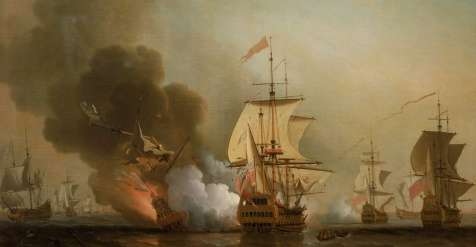Capt. John Hull made frequent trips between America and England as early as the 1680s. He ran a profitable line of ships between Newport, R.I., and various ports in England.
A Quaker, Hull found Rhode Island more hospitable than England, where the Quaker minority was often harassed. Rhode Island, by contrast, was more tolerant. But Hull maintained ties with England. When a Quaker boy from a noble family needed a home, Hull, even in far-off America, was the choice.
Charles Wager’s father had been a well-respected admiral in the British Navy, but his death when his son was still an infant left a gap in the lineage. Wager’s Quaker family sought to have the young man apprenticed to the Hulls. They were family friends and might train Wager to follow in his father’s footsteps as an admiral.
An Admiral in Training
The young Wager made it clear he intended to be every bit the seaman his father was.
The Book of Hulls records an early exchange between Captain Hull and his young protégé: “Step on board, Charles. Perhaps thou may get to be a captain one of these days,’ Hull said. Charles replied, ‘If I do not get to be an admiral, I will be disappointed.’”

Sir. Charles Wager, One-Tine Apprentice to Capt. John Hull. National Maritime Museum Collections, by Thomas Gibson
Indeed, Wager did become an admiral, and a much admired one at that. In part thanks to his service with Captain Hull.
Running trading vessels between England and America was not for he faint of heart. The trade routes to the European coast were abuzz with pirates or privateers, depending upon the political climate, eager for any prizes they could capture.
On one of Hull and Wager’s voyages, a French privateer set course to intercept Hull’s vessel. Though his was the larger and faster vessel, Hull had a dilemma: His Quaker pacifism would not let him engage the privateer.
John Hull Takes A Back Seat
The young Wager had no such reservations. As he loathed the idea of giving up his ship and cargo, Hull removed himself to his cabin. He left Wager in charge of the vessel, intent on running the smaller French vessel over and sinking it.
Yet, family lore has it that Hull’s Quaker principles did not prevent him from helping his apprentice.
“Charles,” he reportedly shouted from his cabin, “if thou intend to run over that schooner, thou must put the helm a little more to starboard.”

Wager’s Action off Cartagena, 28 May 1708 The English painter Samuel Scott
Wager succeeded in thwarting the attack. It was the first real hint – beyond his bloodlines – that he was destined for an admiralty. Indeed he did ascend to the title First Lord of the Admiralty – the political head of the British Royal Navy – from 1733 and 1742.
Wager began his British naval service in the 1680s. He enjoyed a respected career, seeing action in the War of Spanish Succession. He was perhaps best known for his confrontation with the Spanish treasure fleet attempting to bring gold from South America to Europe to fund the Franco-Spanish war effort in 1708. Wager’s ships thwarted the Spanish vessels, and he became rich in the process.
Wager was also a regular visitor back to the American colonies in the years before he rose to the peak of his power, often serving in convoys that protected colonial goods on their way to England.
Yet he never forgot Captain John Hull, who gave him his start. The two traded letters and gifts until the older man died in 1733 at his 370-acre plantation on Rhode Island’s Conanicut Island.
This story last updated in 2022.
